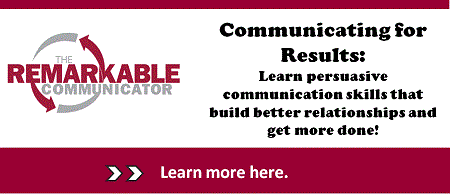 That is an interesting title isn’t it?
That is an interesting title isn’t it?
Does it leave you curious?
Or does it leave you scanning through words in your mind, in a competitive way, trying to guess if you come up with the right one?
Either way, I hope I have influenced you to read on . . .
While you likely want to know that word, the most important word in the title isn’t the word that is missing; the most important word is influence. The problem with the common word that I will identify in a minute is that it is used all of the time, and most of us don’t even consider it a problem . . . and it is probably one of the first 100 or so words we learn as a kid.
It is common.
It is easy.
It is powerful in a sneaky kind of way.
Two Keys to Influence
To influence others is to help them see a new or different perspective, one that is different than their own. Two factors are very important to making this happen:
- As humans, we want to be acknowledged for who we are, what we know, and therefore for our opinions and perspectives. We know that not everyone will always agree with us, and when we feel valued and important we are in a better place emotionally (and logically too).
- When learning new things, our brains work best, in part, when we can connect what we are learning to something we already know. In other words, it is easier for people to learn and incorporate things that are connected to current knowledge, opinion and perspective than to learn something completely new and separate from what is already known.
Our mystery word defeats both of these truths in just three letters.
This word acts like an eraser, removing any acknowledgement for the other person and disconnecting what follows from what came before.
“I know what you mean, but . . .”
“That might have worked there, but . . .”
“Your idea might have some merit, but . . .”
Do you see how the word “but” erases both the value of the person and their perspective in three short letters?
To be more persuasive and influential we must remove the word “but” from most conversations.
But creates division.
But causes people to pause.
But highlights disagreement.
But negates.
But creates black and white, right and wrong.
And none of those things serve you in influencing the other person (or in nurturing your relationship with them).
Some people have said that but stands for “Behold the Underlying Truth.” And when you think about it, it makes sense. When we hear “but” we know that the other person only really wants us to hear what comes next.
The “Simple” Solution
 So if “but” is the problem what is the solution? The simple solution is to replace the word but with another three letter word . . .
So if “but” is the problem what is the solution? The simple solution is to replace the word but with another three letter word . . .
And.
“I know what you mean, and . . .”
“That might have worked there, and . . .”
“Your idea might have some merit, and . . .”
Do you see the difference?
And is inclusive.
And is acknowledging.
And is possibilities.
And is shades of gray.
And all of these things allow the other person to feel acknowledged and be more open to your point of view or perspective —which captures the two keys to influence we just talked about.
The Underlying Solution
While a simple vocabulary replacement is a good start, underneath the word choice is a more fundamental solution. Choosing the word “and” communicates a different approach, a more inclusive, acknowledging, and open minded viewpoint. And . . . to be truly more effective and influential, it is about more than vocabulary replacement. We need to have an “and” mindset.
You might be able to persuade someone to your perspective or idea without applying this simple idea, but it will be harder.
AND . . .
When you persuade people from a perspective of open-minded inquiry your success will be greater and come easier.
Beware “but thinking”.
And run towards the “and”.


You had me at “one word”. Kevin it was a good title that had me read the entire article on the spot. Good reminder.
Interesting concept Kevin. I agree. But I had never considered it before, so thanks.
Thanks David, and . .. I hope you are well!
Thank you Kevin,
for this very valuable reminder.
Working with French speakers, I have picked up the habit the French do frequently. They usually start with an affirmative comment such as “oui” (yes) just followed by “mais” (but.) to make their point. You have made me aware that this is a habit I better not imitate any longer. Thinking of it, I also do it in German, starting with “ja” (yes) followed by “aber” (but).
You made me discover a possible reason, why my facilitating question do not always have the desired effect. While I may create curiosity, I kill it with my reaction to the answers I get.
I learned a very important lesson today.
Thank you.
– Christian
You are welcome Christian… “Yes, but” as you described, isn’t your most effective approach to influence and persuasion.
Kevin 🙂
Thank you for that valuable insight, Kevin. I consider myself a pretty good listener, and… I’m sure there are times I need to get my “but” out of the way.
Best wishes,
Mary Jo
Kevin,
I was taught this concept (and now teach our employees) in relation to customer service techniques. It was on a list of “words to avoid” and really caught the class’s attention because it is so widely used. It really takes concentrated effort to avoid this little word. Think about how it could change our relationships, even our families. A great reminder and challenge!
–Jayne
I’ve worked very hard to get better at this. It is a challenge … and… it is worth it!
Hi Kevin
Brilliant piece and so appropriate to remind people to focus more on and and less on but.
Thanks for sharing
Nice, interesting piece! Thanks for letting us share it! Best to you!
Hello Kevin,
“And” is at the heart of all great improv! Excellent post and reminder.
Thank you!
Great post Kevin. My guess was lucky and right. I agree with Duncan….more “and” and less “but”. Thanks for sharing with us!
Hi there! This is my first visit to your blog!
We are a group of volunteers and starting a new initiative in a community in
the same niche. Your blog provided us valuable information to work on.
You have done a wonderful job!
Great read….simple AND effective!
Kevin, I couldn’t agree more. I see this so often and in fact have blogged about it here http://wp.me/pW697-aS
Thanks for a great read,
Michelle
Hi. Thanks for another great article. I wonder if there are times when “but” is appropriate, such as when we want to encourage someone who is seeing the negative side of something but not the positive. For example, “I know you think you did poorly in this situation, but have you considered what you learned/how you showed your skill in this way/what benefits came from it …” Does that work to challenge a thought that maybe should be challenged? “And” doesn’t seem as powerful in that context.
Deidre how about this?
“I know you think you did poorly in this situation, SO LET’S consider what you learned/how you showed your skill in this way/what benefits came from it”.
This recognises that the negative thoughts that the other person holds have some validity in their mind at that point. By being encouraged to consider the other positive things they can then choose to change – for themselves – the validity of those old thoughts and replace them with new ones. The power then comes from them making the change themselves.
Kevin
A great reminder of something I was taught many years ago and had slipped into my subconscious. Now it will be good challenge to consciously review my word usage. ‘And’ substitution is a really great place to start – the next stage could be for us all to be creative and consider other appropriate ways to reword.
Good stuff Kevin – thanks for sharing…
Kevin 🙂
That’s great – thank you!
Deidre
You are remarkable Kevin! Many thanks for all of your tips and ideas – this is great and I especially like your article where you referred to ‘The Biggest Loser’ programme.